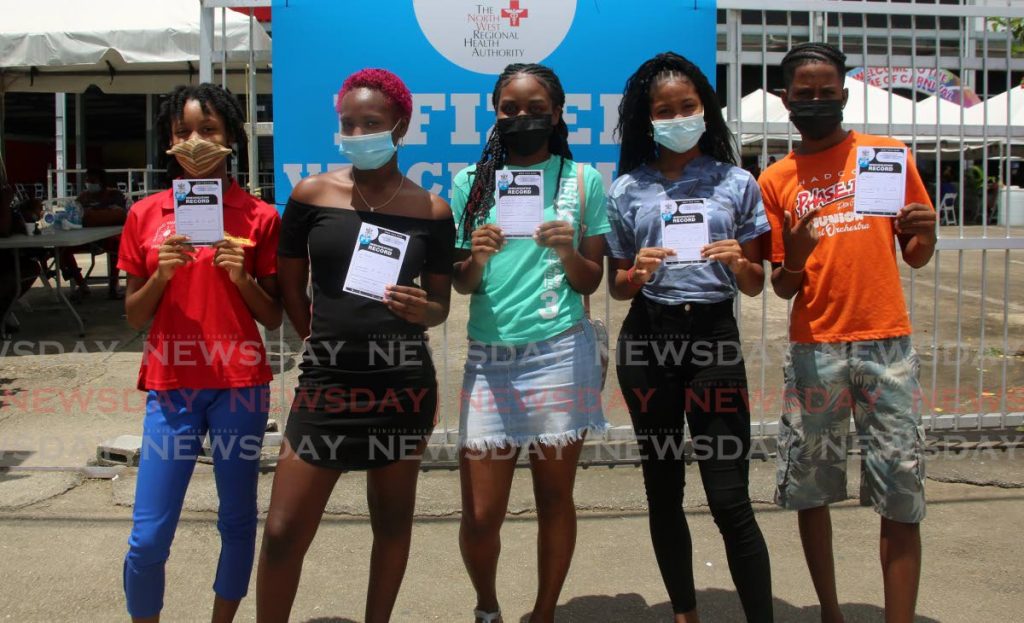Anxiety over covid19 most common side effect in children

There have been no cases of myocarditis, pericarditis or significant cases of anaphylaxis in children caused by the Pfizer covid19 vaccine in TT according to Dr Joanne Paul, head of the Paediatric Emergency Department, Eric Williams Medical Sciences Complex, Mt Hope.
Speaking at the Health Ministry’s virtual press conference on Saturday, Paul said myocarditis, pericarditis due to Pfizer in the 12-18 age group was one to two per million.
“The reality is, in terms of real, significant myocarditis or pericarditis, we have had none. What we have found, most of the side effects have been anxiety-related and anxiety associated – heavily so.
“Children, especially in that age group, might be so anxious, that they might have chest pains. It’s just a matter of having some stomach irritation, they feel they might have vasovagal episodes where they feel a bit faint. But once you’ve resolved the anxiety and they are reassured, their symptoms go away.”
She said with anaphylaxis or allergic reactions, the tongue, lips, eyelids, and face swells, breathing is difficult, a rash could develop, and more. When asked about the teenaged girl who reportedly had an allergic reaction to the vaccine on August 18, she said that too was anxiety-related.
“The patient was transferred to the emergency department and was assessed there. The thing is that if you have an anxiety attack, you may feel that you can’t breathe, it’s almost like hyperventilating. When the patient was assessed what we found was there was a lot of anxiety related symptomatology.”
Responding to questions she had been asked by members of the public about children returning to school, she said physical school was important for the socialisation and mental health of children, especially adolescents. Therefore, it was necessary that students, teachers and school administrative personnel be vaccinated so children could return to physical school.
“Of course, when we do have them in school we are going to have increased infections because more (people) are in a particular area. There’s going to be some transmission but, once they are vaccinated, we’re not going to have the surge, ICU cases and deaths.”
She said people should keep four layers of protection by adhering to the public health measures, getting vaccinated, strengthening the immune system, and caring for their mental health.
Country Medical Officer of Health for Caroni, Dr Jeanine St Bernard, endorsed the vaccination of children saying that she carried hers to be vaccinated on the first day of the rollout.
She said her children wanted to get back to in-person schooling as it allowed children to ask questions of teachers directly, and to work as a team on projects, solving problems, and playing sports. It also allows for visual, auditory, kinesthetic, and reading and writing learning.
“You get to bounce ideas off your friends, share concerns that you have face-to-face. Kids need that face-to-face environment to really thrive.”
Paul added that most of the children who were infected with covid19 were asymptomatic, while two per cent had severe cases, and 55 had confirmed cases of multisystem inflammatory syndrome in children (MIS-C).
“We have had the most in the Caribbean. In fact we are about maybe four to five times per capita more than any Caribbean country. We’re not sure why but we know we have been having them confirmed, treated and there have been no deaths so far from MIS-C in Trinidad at all.”
She said it was important to vaccinate children to protect children from the delta variant which was affecting the unvaccinated, youths, and children. It would also help the country achieve herd immunity, to reduce the need for hospitalisation, intensive care unit care, and death.
“If you have an unvaccinated population, the virus just goes from one to the other really fast and it accelerates. It’s almost exponential, it’s almost like an avalanche so it goes through really fast.
“Now with vaccination, it’s like having mini beakers. So as soon as it goes from here to here, it stops it, it slows it down, so you don’t have that surge happening, that acceleration happening.”
Chief Medical Officer Dr Roshan Parasram reported that 37,657, about 41 per cent, of the approximately 90,000 secondary school children have received at least one dose of the Pfizer vaccine.
Also, with Pfizer, the immune response in children was just under 100 per cent protection from severe disease and death, which was a much better immune response than in adults.


Comments
"Anxiety over covid19 most common side effect in children"